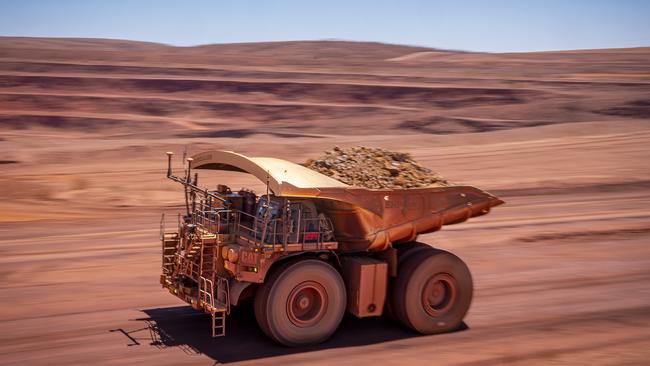Big miners could bear the brunt of President Trump’s move to swiftly impose tariffs
The Australian share market is expected to fall from near-record highs following President Donald Trump’s shock move to immediately forge ahead with tariffs.

Business
Don't miss out on the headlines from Business. Followed categories will be added to My News.
The Australian sharemarket is expected to fall from its near-record highs as a result of President Donald Trump’s shock move to immediately forge ahead with tariffs on China, Canada and Mexico, while the weak Australian dollar could come under even more pressure as the global economy absorbs the shock.
Futures markets predict the ASX 200 index will fall about 1.2 per cent on the open on Monday, while the Australian dollar has fallen about US1c to about US62c over the past week and could come under more pressure as concerns about potential falls in global economic growth increase.
While the tariffs confirmed by President Trump over the weekend do not directly affect Australia, with China being by far our largest trading partner and the dominant buyer of commodities such as iron ore, reduced demand would flow quickly through to the fortunes of major miners BHP, Rio Tinto and Fortescue.
This would in turn put downward pressure on the Australian dollar.
AMP chief economist Shane Oliver said while Australia’s exports to the US only constituted 4 per cent of our total exports, the real risk was from disruption to the global economy.
“As an open economy with high trade exposure to China, our main vulnerability is to an intensification of global trade wars under Trump, as Trump imposes tariffs and other countries respond with tariffs on the US resulting in a fall in global trade, particularly if it weighs on demand for Chinese exports,’’ Dr Oliver said.
“An OECD study showed that Australia could suffer a 1.2 per cent reduction in gross domestic product as a result of a 10 per cent reduction in global trade between major countries. Resources shares would be most at risk.’’

Dr Oliver said the Australian dollar could experience more weakness, “perhaps testing the recent lows of around US61.5c”.
“Anything which restricts Chinese exports mean less demand for our commodities, which is bad news for Australia,’’ he said.
Dr Oliver said the impact on Australia was not huge the last time Donald Trump imposed tariffs on China back in 2018, but that was no guarantee of smooth sailing now.
“You could argue we survived. It didn’t have a huge impact in 2018 when Trump ramped up tariffs on China and elsewhere, but still the Aussie dollar did have a dip in 2018, almost a 10 per cent correction.’’
Dr Oliver said the US sharemarket fell almost 20 per cent in 2018 following the first round of Trump tariffs, however that was also in an environment of rising US interest rates.
Regardless it was a “bad omen” for markets, he said.
Nigel Green, chief executive of global financial consultancy deVere Group, said he expected oil prices to go higher.
“Energy markets are already fragile amid global supply constraints,’’ Mr Green said.
“Additional tariffs on crude would inject unnecessary volatility, making fuel and transportation more expensive worldwide.
“This translates to increased uncertainty, particularly for industries reliant on stable energy costs, such as manufacturing, transportation, aviation, and logistics.
“Protectionist policies may score political points, but they rarely deliver sustainable economic benefits.
“Global investors should monitor these developments closely, as escalating trade tensions could weigh on US equities and influence broader global asset allocation strategies.”
Australian Chamber of Commerce and Industry (ACCI) chief executive Andrew McKellar told The Australian President Trump’s tariff announcement was regrettable, with the impact ultimately to be felt by US consumers.
“From a business point of view in Australia we prefer to see as open an international trading environment as possible and we would be concerned if this is going to be the direction of US trade policy,’’ Mr McKellar said.
“It will adversely impact the global trading environment and Australia is, of course, very dependent on that.’’
Mr McKellar said with President Trump also signalling he would push ahead with driving the US corporate tax rate lower than the 21 per cent he achieved in 2018 down to 15 per cent, ACCI was urging both sides of politics to urgently look at tax reform at home.
“We are urging the major parties in Australia to seriously put tax reform and company tax firmly on the agenda for the next term,’’ he said.
“Australian company tax at 30 per cent for most companies is becoming globally uncompetitive. We’re starting to look like a laggard in that space.
“About 15 years ago we were in the middle of the pack. Now we’re the second-highest company tax rate in the OECD.’’
Oxford Economics has speculated that over time, the tariffs could weigh on global oil demand because of less economic activity, taking $US2-$US3 off the price per barrel of oil next year.
With 80 per cent of Canadian oil exported and 97 per cent of that going to the US, there was expected to be a large knock-on effect for investment in the sector in Canada, they said.
And with Canadian imports accounting for about 25 per cent of US refinery inputs, costs for refiners were likely to rise, Oxford Economics said.
The Oxford analysts, speaking before the tariffs were imposed, argued they were the least likely to go ahead given the difficulties they would impose on US refiners.
“We think there is limited scope in the US for substitution for domestically produced West Texas Intermediate crude,’’ they said.
“Added to this, we do not believe US producers would increase output to offset the potential shortfall in Canadian supply.
“Indeed, despite President Trump’s pro-fossil fuel agenda, we have not upgraded our outlook for US oil production since his election.
“Larger US oil producers are focused on shareholder return and reducing their carbon footprint. One caveat is that smaller producers, unencumbered by concerns about shareholder return, could look to increase production.’’
More Coverage
Originally published as Big miners could bear the brunt of President Trump’s move to swiftly impose tariffs





